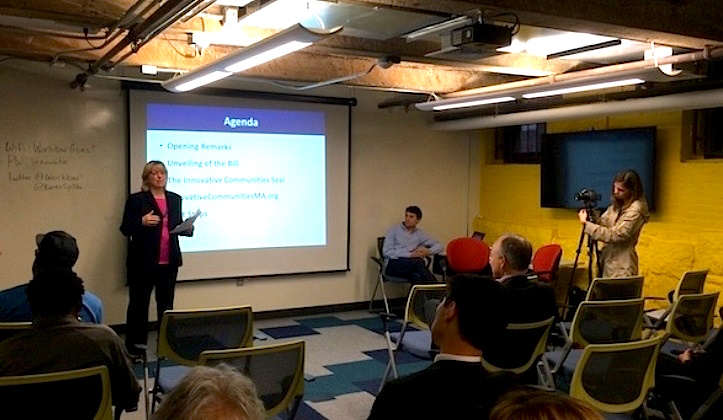4 Initiatives Improving the Massachusetts Innovation Economy

While our state has a big reputation as a tech startup hotbed, the Massachusetts innovation ecosystem has not always had the best or closest relationship with government. We’ve all heard of the Tech Tax fiasco, right? And cities blocking rideshare services?
These issues came directly out of a lack of engagement from both the government and startup sides.
I see four important signs that we are entering a much more collaborative future.
Senator Karen Spilka learned all the right lessons from the Tech Tax fallout. First, there needed to be a dialogue with the innovation community in Massachusetts, so Sen. Spilka created the Tech Hub Caucus to build engagement between the legislature, which can be very confusing and complex, and the startup ecosystem, which is ever changing.
The simple fact that this engagement exists is heartening, and it has already borne fruit.
At a Tech Hub Caucus hackathon at PayPal’s Start Tank (RIP), a group led by Cole Boskey of Autodesk proposed that the Commonwealth make it easier for startups to pilot products and services in partnership with cities and towns.
So Sen. Spilka turned around and wrote the Innovative Communities bill. This bill is a big step toward balancing how cities and towns protect against procurement corruption while also remaining open to the technological advancements developed in Massachusetts.
The program, which launched this week at Workbar Boston, represents a serious and important step toward collaboration and I have high hopes for its impact.
- The City of Boston hired Rory Cuddyer
The City of Boston has led the way for quite a while in supporting technology and startups. Nigel Jacob and Chris Osgood’s Mayor’s Office of New Urban Mechanics has a long history of public/private partnership building in the tech sphere, most visibly in developing Citizens Connect and Street Bump; the ONEin3 Boston initiative started Boston Young Entrepreneurs in 2005 as a way to build relationships with startups; and Mayor Menino’s Innovation District effort carved out a neighborhood and a homebase for a brand new sector’s energy.
But the City has never had a single point of contact for all things startup until now. Rory, who is the City’s full-time liaison to the startup world (aka Startup Czar), comes from the Mayor’s Office where he worked directly with Chief of Staff Dan Koh. This is a clear signal that the Mayor and his staff are willing to put their best young talent toward supporting innovation.
If you’re interested in hearing what Rory’s priorities are, he will be speaking at the next Boston Young Entrepreneurs meeting on May 19th at the DCU Center of Excellence in FinTech.
- The Commonwealth hired Katie Stebbins
Just like the City, the Commonwealth has long had staff with strong connections in the startup world, but Katie’s presence as Assistant Secretary of Tech, Innovation and Entrepreneurship is a huge leap forward.
Katie brings her experience as a member of the “Kitchen Cabinet” of the Holyoke Innovation District to the entire state.
I had a chance to sit down with Katie in April to hear her point of view. Among many other things, she made me hopeful when she spoke about finding entrepreneurial talent in unexpected places statewide, the economic development value of connecting innovation communities across the state more closely together, and the importance of strengthening relationships between startups and large companies.
- The Commonwealth is doing the little things, especially at MassIT
It’s pretty simple to make a splashy hire and claim to care about innovation. It’s another, more difficult challenge to do the daily little jobs that make government more able to support innovation.
Yesterday, MassIT brought MassChallenge, Workbar, NEVCA, Venture Café, Startup Institute, The Capital Network, Xconomy, Mass Innovation Nights and the City of Boston together to map the innovation ecosystem. Their specific focus was on finding how government can be most efficient and impactful in supporting technology startups.
MassIT never intended for this meeting to be covered in the press. It was all about getting better at making Massachusetts better.
Every day, I see more evidence that local and state government in Massachusetts has made a commitment to understanding and supporting innovation and entrepreneurship. As we move forward, it’s our responsibility to take them up on their offer of engagement and keep them honest on their commitments.
What would you add to the innovation agenda? What is government not doing so well? Let me know in the comments!
About the Author: Devin Cole is Workbar’s Director of Business Development, where he focuses on expansion and partnership development. On the side, Devin takes an interest in the civic, social and economic side of Boston as co-founder of Boston Now, Philips Brooks House Association volunteer, and host of Boston Young Entrepreneurs.


